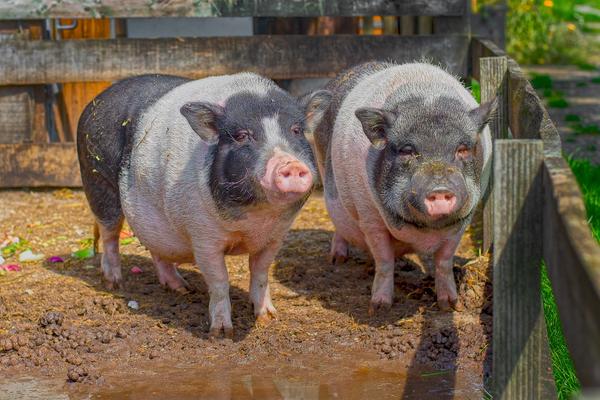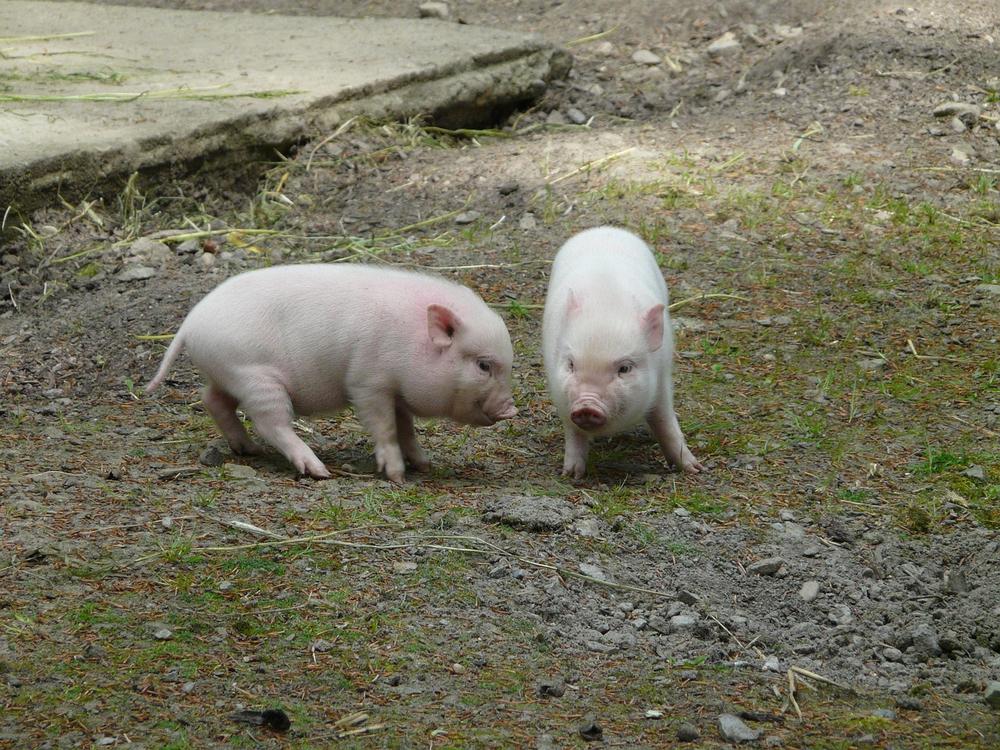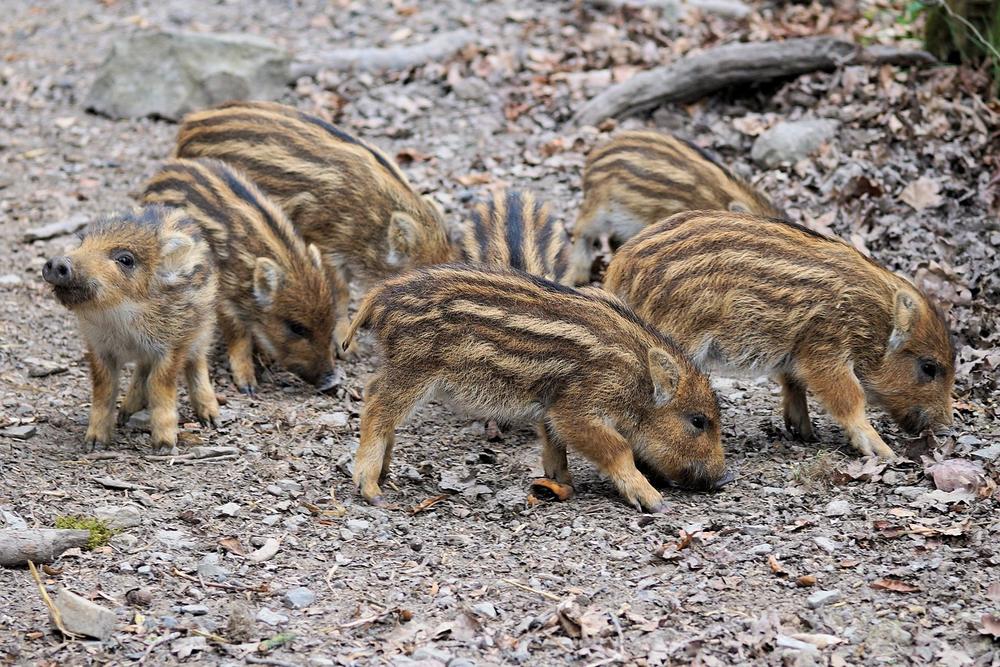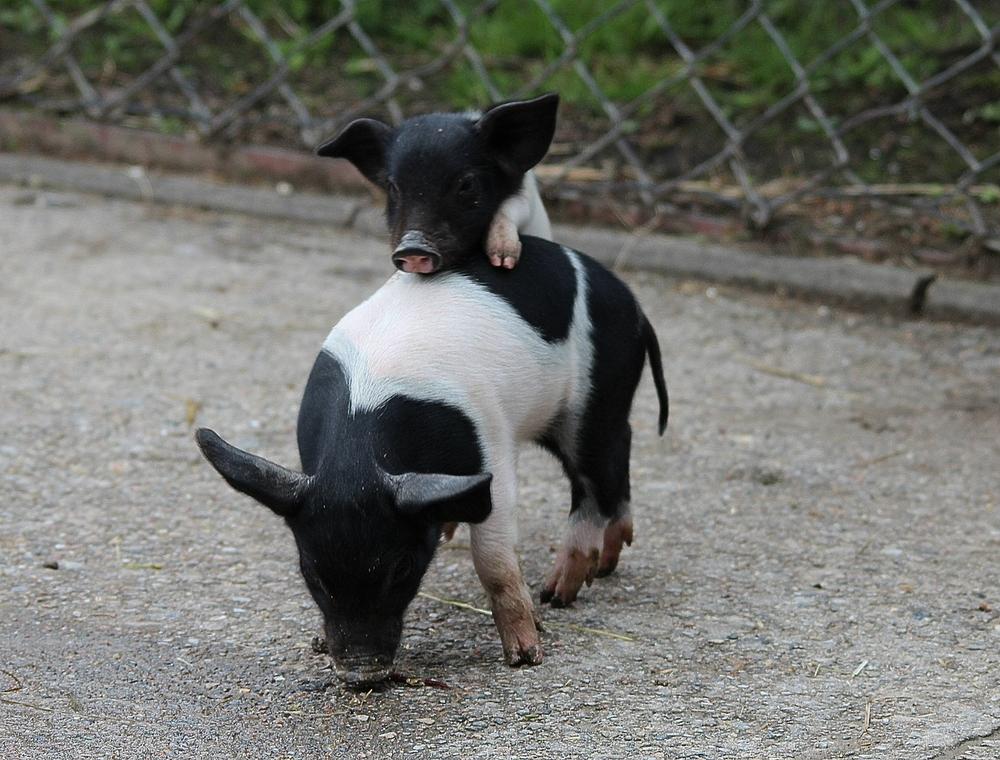What Do Pigs Eat? (On a Farm, in the Wild, and So On)

Ever wondered what pigs eat?
Seriously, don't you lie awake at night, wide-eyed and desperate to know? 😮
I know, I feel your burning curiosity.
Let's dive into the fascinating world of pig chow together, shall we?
What Do Pigs Eat on a Farm?
Pigs on farms need a well-balanced diet. They chow down on corn and soybeans to fulfill their energy and protein requirements. Their diet can also contain vitamins, minerals, fiber, and additives to help them grow deliciously lean meat.
The specific food they require depends on how old they are, their breed, and the environment they're in. Some pigs might need more protein if they have a speedy growth rate.
In terms of food preferences, pigs are not particular eaters at all!
You can feed them a vegetarian diet packed with extra nutrients. However, there are certain foods that you should absolutely steer clear of when feeding them.
Keep chocolate, onion, garlic, avocado, potatoes, rhubarb, and citrus fruits out of their troughs. 😊

If you raise factory-farmed pigs, they typically follow a specialized diet consisting of grains and cereals.
On the other hand, you have the option to create your own pig feed right at home.
This homemade concoction could include ingredients like meat meal, fishmeal, soybean meal, blood meal, tallow, minerals, vitamins, salt, and limestone.
Some farmers even grow their own grains specifically for pig feed!
In fact, these farmers go about it in a manner that benefits the pigs, the environment, and the community.
So when you choose pork products from these farms, know that you are supporting something much larger than just a tasty meal.
Main points I'll expand upon further down this article:
- Pigs are opportunistic omnivores, eating a variety of plants and animal foods.
- Pigs have a wide range of dietary options.
- While some foods healthy for humans may be dangerous for pigs, they will generally consume anything available.
- Pigs' natural diet consists of vegetables, fruits, insects, worms, mushrooms, eggs, and occasionally small mammals.
- Pigs' teeth are essential for ripping apart tough foods and grinding smaller particles.
- Baby pigs can begin eating solid food when they are just 1 to 2 weeks old.
- Pigs require different nutrients in varying amounts, leading to changes in their diets throughout their lives.
- Pellet pig food is easily digested by piglets and commonly used in their diets.
- Pigs need a significant amount of water for daily consumption, up to six gallons a day.
- Pigs require access to high-quality, clean drinking water for optimal health.
And now, let's delve into the fascinating world of a pig's natural diet and their proclivity for diverse food choices!
The Diverse and Varied Diet of Wild Pigs
In the wild, pigs have a diverse and varied diet.
They are opportunistic omnivores, which means they eat just about anything they can find.
Their sharp sense of smell and hearing allows them to forage for food effectively.
So what do pigs eat in the wild?
Well, they enjoy munching on plants like leaves, flowers, vegetables, and roots. But that's not all!

Pigs also have the ability to consume animal foods such as eggs, fish, and carrion.
Their natural diet consists of vegetables, fruits, insects, worms, mushrooms, and sometimes even small mammals.
But here's an important point to consider - while pigs may eat meat, it can lead to health issues like high blood pressure and heart disease.
So, although pigs have no qualms about devouring whatever is available, you should be mindful of their diet to keep them healthy and happy.
Now, here's the deal...
While wild pigs have an incredibly diverse and varied diet, just how do owners ensure their domesticated pigs get the right nutrition?
What foods should you provide them with to keep them healthy and happy?
Let's explore the expert advice and tips on feeding pigs in the next section.
The Hunting Skills and Feeding Habits of Pigs
Pigs rely on their incredible sense of smell to find food. They can easily detect both plants and animals that they can eat.
Their keen sense of smell helps them locate suitable food sources without any problems. In addition to their sense of smell, pigs also have strong teeth that are vital for tearing apart tough foods. These teeth allow them to grind or chew smaller particles, making it easier for them to consume different types of food.
So, with their great olfactory abilities and powerful teeth, pigs are well-equipped to find and consume the food they need to thrive.
What Do Baby Pigs Eat?
Regarding the feeding of piglets, there are some important facts you should be aware of:
- You gotta remember, for the first 6 to 8 weeks, these little guys need their mother's milk. It's packed with all the good stuff they need to grow big and strong.
- But, if these piglets don't have a mom or get separated from her, they can start eating solids as early as 1 to 2 weeks old. You can use some milk replacer or goat's milk till they're ready for proper pig food.
- As these piggies get older, you can slowly introduce pellet pig food into their diet. Start by mixing it with milk replacer or goat's milk, and then up the amount of solid food as they grow.
- By about 9 weeks old, these piglets should be chowing down solely on solids. Their nutrition needs change at this point, so ensure you give them a balanced diet with all the vitamins and minerals they need.
Also, bear in mind that different stages of a pig's life require different nutrients.
Weaner pigs need more protein and energy than finisher pigs or adults.
And don't forget, pregnant sows have their own special nutritional requirements too.
So, adjust their feed to match their stage.
It's super vital to understand what these baby pigs eat and give them a proper diet if you want them to stay healthy and grow properly.
So, now that you know what baby pigs eat and how their feeding requirements change as they grow, you might be wondering about the optimal growth rate for raising pigs.
How quickly do pigs really grow and what do they need to thrive? Well, in my guide to pig growth and feeding requirements, I delve into this topic in detail.
If you're eager to learn more and ensure your pigs are growing at the right pace, I invite you to check out my article on How Quickly Do Pigs Grow.
The Daily Water Requirements of a Pig
Pigs, or hogs if you prefer, are real water guzzlers.
I'm talking a whopping three to six gallons per day!
That's quite a lot, you gotta admit.
But it makes sense, since pigs have quite the appetite.
Anyway, let's get back to the water.

Now, here's an important tip for ya. Make sure you always give your pigs fresh water.
And yup, that includes those adorable little piglets too.
Keep the water cool, around 18-20°C. If it's out in the sun, make sure it's insulated or buried so it doesn't turn into a hot bath.
Oh, and don't forget to install nipple drinkers.
They control the water pressure based on the age of the pigs.
For example, piglets and weaners need a flow rate of 0.5 liters per minute, while lactating sows require 2.0 liters per minute.
And don't forget, clean drinking water is crucial for the best health of your pigs, especially in scorching weather.
And that's all for today folks.
Before you leave, let me ask you something: Did my blog post help you out? If it did, I would be extremely grateful if you could share it with your loved ones. Just click on any of the icons for social media sharing and spread the word instantly. Thank you so much!
Until next time,
-Chris Campbell